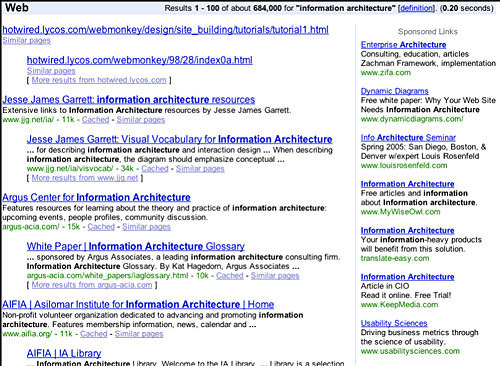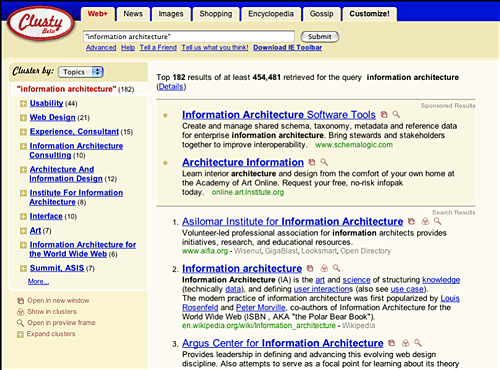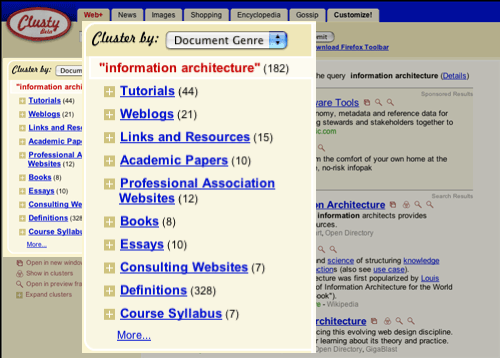April 27, 2005
whither mobile?
Last week, my colleague Janice wrote an inspiring essay entitled, "It's A Whole New Internet." She addresses the zeitgeist of excitement around web development, talking up tags, Ajax, developer idealism, and the like.
One thing missing from her essay is any mention of design for mobile devices. Three or four years ago, all signs pointed to mobile being the Next Big Thing. I fully expected the mobile design community to have the starry-eyed excitement and energy that the web design community had in 1996, 1997. And that mobile design would genuinely excite people.
Why hasn't that happened? Why haven't any mobile and device design innovations had the same level of engagement, interest, and excitement that Ajax and folksonomies have had? Where are the passionate back-and-forths about the implications of mobile device innovation?
I fully recognize that this may just be me. That maybe I'm not witness to the communities speaking passionately on these issues. But I'm surprised that such discussions haven't gotten more mainstream by this time.
I did some searching around, and the amount of quality discussion on developing good user experiences for devices is surprisingly low. The bulk of the discussion seems to hover around utilizing web standards so that your site can be viewed in mobile browsers. That strikes me as fundamentally uninteresting. I did, however, come across two very thoughtful pieces that suggest we must fundamentally reconsider design for mobile devices. It's not just about making things smaller:
Mobilize, Don’t Miniaturize is an essay by Barbara Ballard making clear that the approach to designing for mobile is not to take an existing app and try to make it work for a very small screen, but instead to understand the context of mobile use and utilize that for applications specific to mobile.
In a similar vein,Design For Small Screens(PDF) is a presentation by Marc Rettig wherein he states near the beginning, "It's about more than just screen size." Filled with lots of good photos.
April 23, 2005
Eric Idle Supports Iterative Design and Testing
I'm watching The Life of Brian DVD, and on the commentary track, Eric Idle just went on about how he loves testing films in front of audiences, because it allows you to shape the film in response to an audience, in the way that live theater will shape their production over a series of performances. He says,
"We would always have previews of our movies, a lot more than they do here, in Hollywood... Previews tell you a lot... when you first do a cut, you do what you think is funny. And then when you show it to an audience, they tell you what's funny. The more you listen to what an audiences is telling you, the more you can cut it to how it would be if you were performing it live... The intelligent process is to show it to smaller groups of people more frequently, rather than to one or two large groups of people in a valley who then fill in forms... [In America] they don't give it enough time to move towards its audience, and to listen to what its audience is telling it back, because of the economic pressure of getting it in and out..."
April 20, 2005
User Experience is a Quality, Not A Discipline
One of the things that has been hard for the "usability community" to accept is that usability is not really interesting in and of itself. And that usability isn't really a goal, and it's definitely not the end-all be-all. Usability is simply a quality. It's an important quality, but just one of many. And it definitely doesn't warrant being a "discipline."
I've begun to think the same thing about "user experience." In a prior post, I wondered if user experience is dead. I wondered this for a few reasons:
- the people who were "leading" the discussion about user experience were doing so back-asswards
- there is a seeming lack of energy behind the concept of "user experience"
- people feel passion for disciplines such as "information architecture" and "interaction design," but if "user experience" were to go away tomorrow, no one would notice.
Perhaps the best response to that post was Dave Rogers' "Is UX Dead?" And in that post, and elsewhere, I slowly realized that "user experience," too, is nothing more than a quality. When user experience is discussed by people outside the profession, they talk about a site or product offering a good user experience. When Kottke writes about Google Maps and user experience, he doesn't talk about Google's user experience designers -- he talks about how the sum of elements leads to a "useful user experience."
This--this feels right. User experience is not a discipline, or an approach, it's a thing, a quality, an emergent property between a person and a product or service.
This puts me in direct opposition with Jesse's diagram. Those aren't elements of user experience. Those are elements of web design. Performing those elements well should lead to offering users a quality experience, yes. But "information architecture," "interaction design," "user needs," etc. etc. don't comprise the user experience. A quality user experience is comprised of things like desirability, usability, enjoyability, utility, delight, satisfaction, etc. etc.
The UXNet Development Consortium, therefore, misses the point entirely. It's trying to solve the "user experience" problem through professional associations. Professional associations don't solve anything. They provide a valuable service gathering place for individuals engaged in similar practices. The development consortium is attempting to develop a "community" of "user experience professionals." All it is is providing a platform for navel-gazing and rehashing. It is moving nothing forward. The outcome of the consortium is pretty much no different than what was discussed at the 4th Advance For Design, in 2001. Has so little changed?
The problem with the development consortium and its approach is, frankly, that it's too small, condescending, and elitist. Not intentionally, mind you. Not in spirit or motive. I know many of the folks involved, and they're good, passionate, upright, and they're doing what they can to make the world a better place. Still, the nature of the enterprise, suggesting as it does that User Experience belongs to this group of groups, strikes me as condescending.
User experience is everyone's responsibility. It is not the special province of interactive systems designers. The scope of people involved in helping supply a quality user experience is so vast, that you cannot draw an interesting circle around it and say, "that's the community."
The only reason that "user experience" is associated with interactive systems designers is because Don Norman didn't want his group at Apple relegated to pushing pixels in the "user interface." As he wrote in an email to me:
I invented the term because I thought Human Interface and usability were too narrow: I wanted to cover all aspects of the person's experience with a system, including industrial design, graphics, the interface, the physical interaction, and the manual.Since then, the term has spread widely, so much so that it is starting to lose its meaning.
User experience should not be just about interactive systems -- it's a quality that reflects the sum total of a person's experiences with any product, service, organization. When I walk into a store, I'm having a "user experience." When I call an airline to make a reservation, I'm having a "user experience." And innumerable elements contribute to affect that quality of experience.
So what can we do? We can move forward by talking about what goes into developing quality user experiences. We should never talk about "user experience design" -- there is no customer or user-facing design that doesn't involve a user's experience. But we can talk about how our methods, processes, approaches, mindsets, and understandings can contribute to improving the user experiences of the products and services people deal with.
This is what gets me excited about DUX. I know I dissed it in my prior post, but that was less the concept of the conference than the seeming foot-dragging in getting it going. Now that DUX2005 has been announced, and a preliminary call for entries posted, it's time for us to talk about the work that we've done, and how it's made people's lives better. The conference is very purposefully titled "designing for user experience," recognizing that user experience is a quality, not a discipline. A very important quality -- in some cases the most important quality.
(Yes, I know that DUX is put on by the same professional associations that I excoriated. DUX is actually put on by individuals, who utilize those associations for their logistical assistance. I hazard to guess that DUX could be as popular if not affiliated with any organization, but maybe a little harder to work out contractual details with venues, etc. etc.)
April 17, 2005
Empowering Search through Genres
Luke's recent post challenging the design of search results pages reminded me that my original genre talk had another way to use document genres to improve the web experience.
When you use a search engine, say, Google, you get a list of ordered results. So, here's what a search for "information architecture" returns.

Which is all well and good, if you want that particular tutorial, or Jesse's particular set of resources. But, considering the 684,000 results, one gets the feeling that there could be more going on here.
Clusty, the hideously named search engine, uses algorithmic juju to identify related topics, and presents those with your results.

All right. I can't argue that this is any better than Google's results, because it's unclear just how these topics are related. If you search on "information architecture" and then click "usability" or "web design," just what are you going to get?
For my talk, I mocked up a Clusty interface that utilized genre as a filter:

The advantages, I hope, are clear. Utilizing genre allows the results to speak to whatever task the user brought to the search. If someone types "information architecture" into Google, they could be engaged in any number of tasks -- self-teaching, looking for consulting help, looking for a definition, considering a career change, looking for a professional association, conducting research, etc. etc. Who knows? By offering genres as a filter, people can use that to narrow the results to those which are personally relevant at this time.
I guess it IS the content, stupid!
At the Webvisions conference coming in July of this year, I will present, "It's the Content, Stupid," wherein I try to remind web designers that the reason people come to their site is not for their design and architecture.
Since submitting that presentation topic, I've been made aware of two similarly titled essays. In "It's About Content, Stupid," some guy named Jeremy Pepper talks about a lot around marketing and PR. I don't know what the title has to do with his thesis. 10 days before that, "content guru" Gerry McGovern offered, "It's the content, stupid: search engine optimization," where he makes it clear that the content of your webpages influences how it's ranked in search results.
Three different discussions, all with nearly the same title.
All of which probably ticks off Gene.
Pics and Words from Hong Kong

I've uploaded a bunch of photos from Hong Kong so far.
This trip has been good. More jetlag than last time -- we weren't able to run around our first two days like we did before. Instead, on the day we landed at 7:10am, we had a meeting at 1pm.
We've eaten very well on this trip. On Friday night we headed into Lan Kwai Fong for Vietnamese food at Indochine 1929. We ordered a set menu (and ended up at the upper end of the price range in that linked review). It was way too much food, but the variety of offerings was great. The butterflied shrimp were amazing, as was the orange duck. Oh, some delightful beef. Anyway, worth checking out -- but order off the menu, your wallet will thank you for it.
On Saturday we didn't get into the city until around 3:30 or 4:00 o'clock. Very lazy going. We met up with Daniel and Jo from Apogee, a local usability firm. They took us to an excellent Sichuan restaurant. Of course, since I was just blindly following, I have no idea the restaurant's name or place. I just know the fried chickens and chilis was excellent, though lip-numbing.

Chilis, up close
Afterward, we had gelato at XTC on Ice. While their vanilla was excellent, it was the hot chocolate, made with red chilis, that was truly memorable. If someone offered that flavor in San Francisco, the place wouldn't be able to keep it stocked.
Today was a wander around Central, with dim sum, shopping, markets, and up the escalators.

Probably the most... arresting site was a fish for sale at the market. With it's heart beating:
 Click to see on Flickr, with Note
Click to see on Flickr, with Note
At a store in Langham Place, I spotted this tea cup:

Which, I think, is brilliant. I don't know what it costs -- it was behind locked glass and the store workers weren't very friendly.
Still haven't bothered with the Peak -- too dreary.
We've got a couple more days here. Which means, more eating!
April 12, 2005
Great overview of the concept of genre
If you've enjoyed the bits I've written about document genres, and you want to go deeper, I heartily recommend Development of the Genre Concept. A thorough history of the idea of genre. It gets pretty academic at times, but worth the slog.
Once Again, To Hong Kong
I leave in 5 hours for Hong Kong, where I'll be until Tuesday morning.
April 11, 2005
Extending Craigslist
In 1996, I had just moved back to San Francisco. I was starting to get deeply into web design, and found myself at Brainwash with a bunch of like minded folks, shooting the breeze about HTML, GIFs, navigation design, and the like. Toward the end of the meeting, one of the people at the table said that we should all get on this great mailing list about what's happening in San Francisco. It was pretty big -- almost 2,000 subscribers -- and covered all sorts of events.
That night, I joined Craigslist.

Not long after that, I met Craig (through the NoEnd mailing list), and kept tabs on the evolution of the mailing list. Well, nearly 10 years later, and Craigslist is a force to be reckoned with. Craig himself is everywhere, a symbol of everything from the power of online community to the humanity of a non-greedy entrepreneur to Public Enemy Number One of newspapers' classified ads.
I unsubscribed from the mailing list long long ago -- too many messages to keep up with. Like many, I use the service via its website, when particular needs arise.
As an information architect, Craigslist has always bugged me. A home page crammed with links, sloppy search interfaces for managing information, and little ability to truly empower the user with this information, instead choosing to overwhelm them with data.
As someone watching the develop of information technologies, I've wondered why Craigslist hasn't been better leveraged. Folks utilize the data and APIs of eBay, Amazon, and Google, building whole businesses on them. Or see the amazing tools built on Flickr (Mappr, Spell with Flickr, Flickr Related Tag Browser).

One thing currently making its way around the Blogosphere is Paul Rademacher's Google Maps + Craigslist Housing mashup, where you use the former to visualize the latter.
I recently worked on the design of an RSS aggregator (a la Bloglines), and one of the things that becomes clear when you look at such aggregators is that they're optimized for blog posts and news feeds. But all kinds of stuff is getting RSS-ified, including every single area within Craigslist. If someone designed an aggregator that focused on Craigslist's feeds, and their particular kind of information presentation, you could have yourself a little business.
I wonder what else you could build on top of craigslist. Clearly, almost everything with an address (garage sale, car sale, etc.) could be mapped like the housing stuff above. Imagine a map showing all the locations of "missed connections" and see if you were there!
Or attach "consumer reviews" to the people offering their services.
Or simply provide a better interface to all this amazing information. Anyway, I think we're going to increasingly see Craigslist data utilized the same way we're seeing with Flickr, Amazon, eBay, and Google.
April 08, 2005
"Egg Freckles?" - Products Beware!

When Garry Trudeau mocked the Apple Newton in Doonesbury for its poor handwriting recognition, he did a lot to doom the device. At that moment, the device became unable to take seriously. So that even when it was improved in later versions, it carried with it the stigma of... mockery.
I've thought about that when thinking about the Segway Human Transporter. Perhaps the most hyped product launch in the history of mankind, the Segway had about a week of maybe seeming cool. Then it kind of was forgotten. But then a couple years ago, with the debut of Arrested Development, we had brilliant product placement for the Segway. It's the way that GOB, the self-involved terribly magician, gets around.

Could we ever take the Segway seriously again?
April 02, 2005
Not All Problem Solving Involves Design
So, I was reading through my bloglines when I came across Victor's recent post, pointing to an article about how JetBlue CEO David Neeleman's business philosophy is influenced by his work as a (Mormon) missionary, driving a desire for equity in how people are treated. Which is all well and fine, except Victor claims David's approach "shows perfectly how the empathy of great design thinking improves both human experience and the bottom line simultaneously."
"Design Thinking" is a phrase that is getting increasingly bandied about, largely in an attempt to take the methods, practices, and approach of designers and apply it to other realms. A movement I'm definitely sympathetic with.
But a problem arises when we think that any "thinking" that we appreciate is "design thinking." It's very much in Victor's personal and professional interest to associate the term with successes like JetBlue. But it's also disingenuous in this case, because nothing in that piece has anything to do with design or design thinking.
Unless we think that designers have somehow cornered the market on empathy, and anyone being empathetic is utilizing design thinking. Which I think is a pejoration of the concept of empathy, and rapidly moves the phrase "design thinking" into the realm of catchy, but meaningless, buzzwords.
In fact, for all the hugger mugger around the term, I've found only one reasonable attempt to capture its meaning, Dan Saffer's post, "Thinking About Design Thinking." I think it's a great place to start, and, if we're able to maintain Dan's focus on the concept, "design thinking" has potential for truly catching on.
